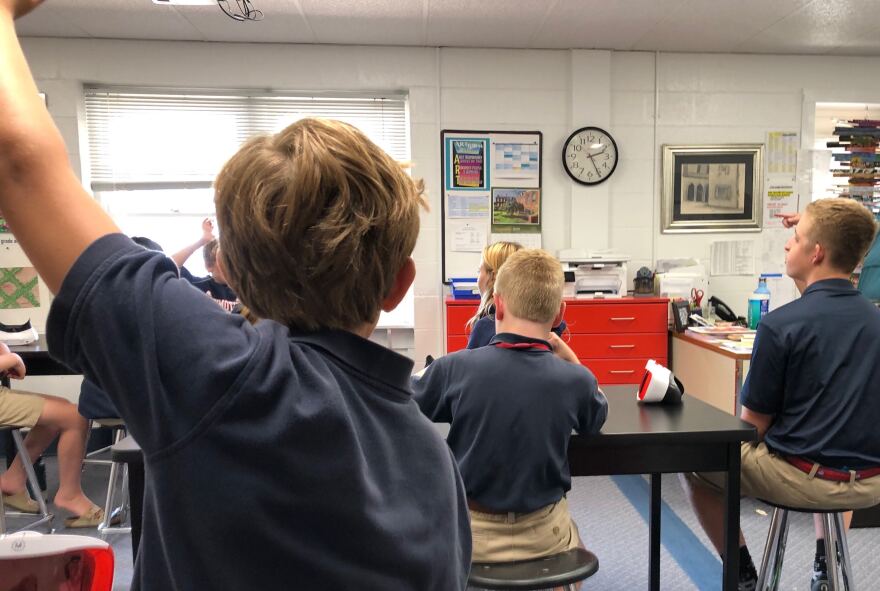Earlier this semester, students in sixth grade at St. Timothy’s School in Raleigh took a trip to the Roman Coliseum and Greek Parthenon. But they did so without ever leaving their classroom.
All it took was a set of virtual reality headsets and help from the school’s technology teacher.
"If you’re moving around a lot, you will get motion sick," technology teacher Bradon Bogumil warned the kids as they donned the headsets. "So don’t do that."
Bogumil can bring VR to any classroom, and he helps teachers craft the "trips." St. Timothy's School started using the technology this school year, and the goal is for all students to go on at least one VR field trip before the end of the school year.

In Kim Balentine's sixth-grade art class, students lift the red and white headsets up to see ancient rock pillars and ruins of two of the world’s best-known structures. The class is learning about Greek architecture for a pottery project.
Balentine leads students through the virtual site and asks them to identify the "tall, worn, rock things."
Hands across the room shoot up, but one student is particularly excited.
"Ooh, maybe those were part of the buildings?" Ella Burnham said. "And they were the columns of the buildings."
Balentine nods in approval. "Excellent, yes ma'am!" she responds.
The field trip goes on like this, Balentine pointing students toward specific aspects of the 360-degreee landscape, asking questions.
But just like on any field trip, students notice more than the one or two things they’re supposed to be focusing on.
"Oh my gosh," yelps one of the students. "That’s a giant dead squirrel."
Down to the right, just in front of the Roman Coliseum is, indeed, a dead squirrel. It causes quite a distraction, as students call across the room to others to ask where it is and how they can find it.
Students, are, after all, still kids. But in a virtual reality field trip, they do have more control over their indiviudal learning experience than on a normal field trip.
"In virtual reality, every student has agency to drive their own learning," said Iulian Radu, who develops and researches emerging educational technology at Harvard University. "That’s where one of the benefits is in these kinds of experiential learning experiences."

Radu said these kinds of student-led opportunities are what make virtual reality, and even augmented reality, a benefit in the classroom. But, he said, educators have to think differently for this kind of learning experience to be effective.
"There’s an expression, instead of the 'sage on the stage,' they have to switch to being the 'guide on the side,'" Radu said. "So the teacher is more of a guide through the virtual experience and their role is now changing."
Field trips have always been the standard for experiential learning. But trips to museums or other locations are subject to permission slips and local opportunities. Anything more than that has always been little more than fantasy.
In the animated TV show "The Magic School Bus," Miss Frizzle would shrink the bus and take her students on wild rides inside the human body or rain clouds. In books like "The Magic Tree House," readers can follow the characters as they are transported to a different historical time and place.
But now with virtual reality, students can get much closer than an imaginary world or pictures on a screen. The technology is shown to provide - on a deeper psychological level - the experience of actually living a different experience.
Creating these field trips is complicated and expensive. As the technology improves, it will get cheaper, and students will be able to experience more and more.
Right now, VR field trips are likely out of reach for large-scale use in public schools.
"I think we will see a lot more field trips," Radu said. "But on a shorter scale."
But even if virtual reality field trips became cheaper than actual field trips, Radu says he hopes they never completely replace getting out of the classroom.
"There’s still something about reality that you’ll pick up by just going to a place," Radu said.
At St. Timothy’s School, leaders say the technology won’t be replacing normal field trips any time soon.







